Introduction
Among the common Google searches related to Gunboat Diplomacy are searches for tips on opening moves for each specific country. I imagine that most people making those searches are players who have just joined a new Gunboat match and are unsure of how to begin. Maybe they’re worried about “blowing it” before the match even starts.
Is this you? If so, you have come to the right place.
I also imagine that some of the people making those searches are players with some experience who, although familiar with the common Gunboat Diplomacy openings for England, want a question answered: which opening is the best one?
Is this you? If so, you have come to the right place.
Your Bored Brother is among the strongest Gunboat Diplomacy players on the internet. I have a strong opinion on England’s best Gunboat opening, and I can explain why.
Read on!
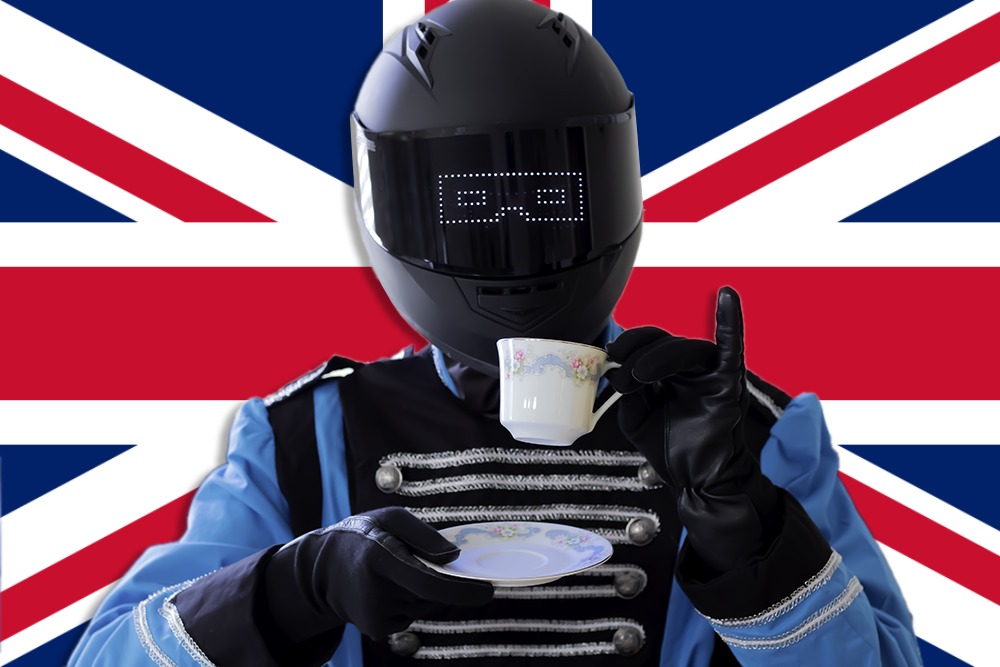
The English Dilemma
As I explained in my Tier List for Gunboat Diplomacy, I rate England as a C-Tier power in Gunboat Diplomacy. The C-Tier powers (England, Austria, and Russia) have a difficult time making allies in Gunboat, and can be wiped out early despite either careful and defensive play or even early expansion.
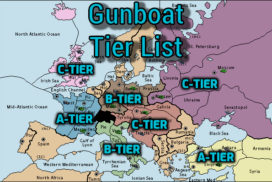
At the start of the match, England does not have good diplomatic or strategic prospects. Other powers are planning to quickly collect the neutrals within England’s reach. England’s best expansion point is Norway, but moving to Norway in 1901 antagonizes Russia and typically draws England into a distracting fight over Scandinavia. Just defending Norway might use up most of England’s forces, and expanding further often requires using all of them. Meanwhile, England’s backdoor is open to France.
Thus the dilemma: you can concentrate on the North/East and risk a French attack, or you can preemptively fight France and risk losing the foothold in Scandinavia.
Going North/East…
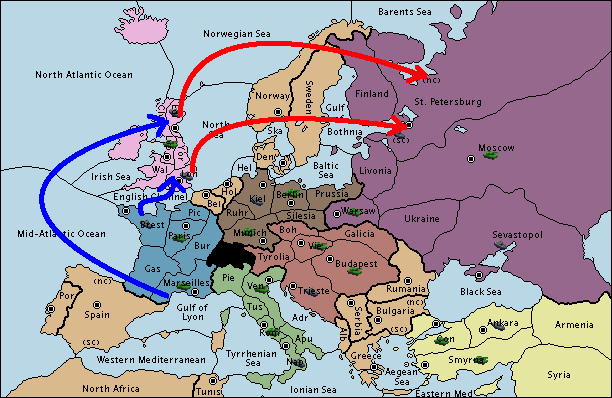
The instinct of most English players is to throw everything East, shut down Russia’s port at St. Petersburg, and expand into Scandinavia. It’s undeniable how tempting this is. If England succeeds in conquering all of those centers before France attacks, England has a decent shot at a solo win. But pursuing this plan is a mortal risk for England: a competent France will launch a backdoor invasion of England if England sends even 1 too many units East.
If France ever convoys an army onto Great Britain, England will likely never recover—even if England conquers Norway, Sweden, and St. Petersburg!
In Gunboat Diplomacy, the A-plan for France, France’s default best strategy, is to do exactly that: bide time to bait England into throwing too many units into the Northeast—then strike England. I believe this is the easiest and most common way for France to get solo wins in Gunboat.
Germany, and sometimes Russia, should fight like hell against England and wait for the French bailout. If Italy has not attacked France, a competent French player is highly likely to make this attack.
…Going South
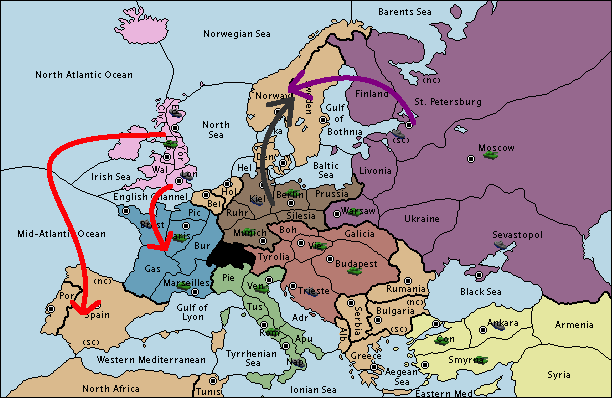
But if England doesn’t put enough weight into the Northeast, Russia and Germany can carve up Scandinavia and seize control; they have no real incentive to see English units in these places. Furthermore, there aren’t any centers England can quickly take when attacking France at the beginning, and it’s almost trivial for France to defend against a solely English attack.
If Germany first takes control of Scandinavia before France takes any English center, then Germany might be able to play out to a draw with France or make a play for a solo win by landing an army in England before France does.
England’s 1901 Goals
It pays to think about long-term strategic goals right from the start. By working backwards from the challenges you will likely face during mid- and end-game, you can get a sense of what your priorities should be at the start. In my opinion, England has two main goals in 1901:
Goal #1: Make a Capture
Obviously, you need to capture supply centers to win. For England, getting a foothold somewhere is a challenge. You definitely need to capture at least 1 supply center in 1901. Let’s talk about which centers you should consider capturing:
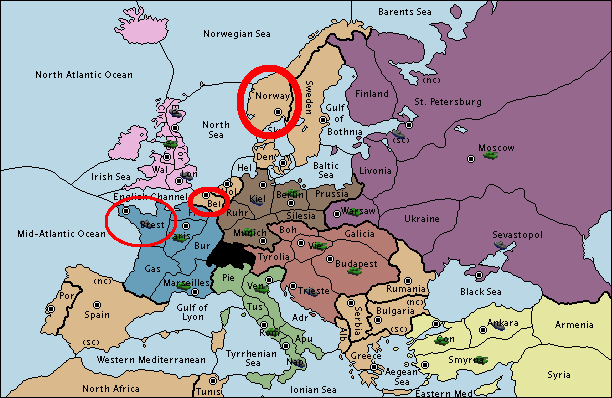
- Norway. Only Russia can potentially try to stop you from getting into Norway, and Russia rarely even tries. Norway is the obvious capture for England.
- Belgium. France and Germany are also eyeing this center. For reasons I will explain later on, Belgium is not the ideal place for England to establish a foothold.
- Brest. If you can capture Brest, that’s awesome. But France has the ability to block such an attack, so it is best to think of Brest as a possible bonus capture.
Don’t bother going for Denmark or Holland in 1901. Against any competent German player, you will never capture these centers, only bounce Germany. Harassing Germany is not strategically wise and also comes with tactical opportunity costs. Moving into Holland or Denmark in Autumn 1901 is a foolish move for England.
Goal #2: Destroy France
Let me not mince words: in Gunboat Diplomacy, I consider the destruction of France to be a top strategic goal for England. I previously wrote about how I believe the Anti-France Metagame I encouraged on webDiplomacy is completely justified.
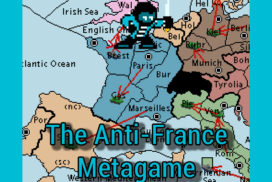
I stand by everything I said, and to that I add that England in particular has extra incentive to consider the destruction of France as a major strategic goal:
- England and France have almost completely overlapping solo win plans, and thus one cannot hope to win without destroying the other. This means you must destroy France, and it also means you should not trust France.
- France is more likely to field a large number of fleets than Germany or Russia. France can win the match building very few armies, and can thus afford a large number of fleet builds to fight England with. Germany and Russia, even when antagonistic to England, almost always have a tactical incentive to build some armies. Thus, any potential French builds are a greater strategic threat to English naval dominance (key to both English defense and offense) than potential German or Russian builds.
- Tactically speaking, Germany and Russia are relatively easy to conquer late in the game compared to France. This is because Portugal, Spain, and Marseilles are relatively easy for a defending alliance to protect from the Southern side of the map. By contrast, Munich and Berlin tend to be difficult to hold onto from the South in Gunboat matches, and St. Petersburg is actually impossible to defensively stalemate from the South. Thus, England’s chances of solo win are higher if France (and more specifically the difficult centers at Portugal, Spain, and Marseilles) are conquered early on.
Attack First, Think Later
Attack First
Think Later
After a few turns, you can re-assess your goals. Maybe the French player seems like a pro-England novice and the German player seems like an anti-English shark, so you decide to prioritize war with Germany. That’s all good here. Flexibility is key to success in Diplomacy.
But with no particular knowledge of the players, their intentions, or the board situation that is about to unfold, you still have to make your choice of opening moves. So although there is no guarantee that destroying France immediately will be the best strategy for you every game as England…what else do you have to go on but what typically happens in Gunboat games?
Get Help Against France!
In a gunboat war between France and England, France has the tactical advantage. What’s an English player to do? Seek allies, and seek them immediately.
- As England, you want Germany and/or Italian help against France.
- As England, you want Germany to keep Russia out of Sweden in Autumn 1901.
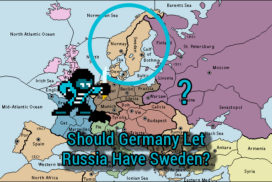

Ask yourself: “Is there anything I can do in Spring 1901 (the opening moves) to demonstrate my desire for German and Italian help, to signal a willingness to cooperate with those powers?”
At the very start of a Gunboat match, you only have a slight idea of how the other players will think. There are conventional strategies and openings (sometimes called “the metagame”), but that’s no guarantee. Nevertheless, there is at least some chance that you can influence how your rivals choose their moves in Autumn 1901 and beyond, so as England you should consider your options with that potential diplomatic influence in mind.
Waffling over Belgium

In Gunboat Diplomacy, it is unrealistic and unnecessary for England to take (let alone keep) Belgium in the early game.
First, as a tactical matter, any unit you place in Belgium is at serious risk of a forced disband.[1]Referring to the situation where a unit is dislodged and has no retreat option, so it must disband. France and Germany are highly likely to cram armies into Burgundy, Picardy, Ruhr and Holland to set up to capture Belgium and/or guard against attacks from England and each other. Further, France and Germany can easily disrupt any support orders you put in from any fleets you have at English Channel or North Sea.
Second, putting yourself in the way of a war between France and Germany is a diplomatic disaster. France and Germany literally cannot fight each other while you are in Belgium, so both powers are likely to fight YOU (England) for control of Belgium—and probably attack you with their fleets as well!
Third, the opportunity cost is huge. If you use nearly all your forces to fight for Belgium, you might be getting flanked somewhere or giving up the chance to expand into defensible areas of the board (like Scandinavia or Iberia).
Fourth, France and Germany typically take Belgium with an army, which means you can just ignore it. That army can’t do anything to harm you as long as no enemy has a fleet in English Channel or North Sea (for convoying).
“Who should be in Belgium? France or Germany?”
The answer is: Germany.
As England, one of your major strategic goals is to minimize the number of fleets players are building or bringing into the north. Putting Germany into Belgium (instead of France) is a way to accomplish this goal.
Nearly all French and most German players will build an additional fleet and an additional army as they reach 5 total supply centers.[2]Typically Germany reaches 5 by capturing Denmark and Holland, and France by capturing Spain and Portugal. The difference though is apparent when it comes to what those powers will do with their build if they reach 6 supply centers.
Most French players will build every fleet they can get away with building, as the only supply center France needs to reach 18 that is landlocked and not a French home center is Munich, which is right next door anyways (all the other centers France needs to reach 18 can be fought over, or MUST be fought over, with fleets). Thus, France will typically build another fleet if France captures Belgium.
By contrast, Germany will rarely build a third fleet at 6 supply centers. In fact, the only time I would build a third fleet at 6 supply centers as Germany would be if England appeared to be my biggest threat—a conclusion I would never reach if England helped me into Belgium!
So my advice is based on that simple calculation: fleets in the north are bad for England. French will probably build a fleet if France captures Belgium. Germany will probably not. Therefore, Germany gets Belgium.
Opening Moves
Let’s get to the part you came here for!
Plan #1: English Channel Opening
- Fleet at Edinburgh move to North Sea
- Fleet at London move to English Channel
- Army at Liverpool move to Yorkshire
What’s good about this line of play?
1. Norway Convoy
You can follow up in Autumn 1901 by convoying your army into Norway with North Sea. The convoy is sure to succeed unless Russia also opens by moving Moscow to St. Petersburg. And in Gunboat, Russia rarely opens by moving Moscow to St. Petersburg.[3]Even if Russia does open to Moscow, it does not help Russia much to bounce England out of Norway in Autumn 1901. A bounce at Norway doesn’t result in a capture for Russia, and prevents Russia from building an additional unit at St. Petersburg. So Russia will, as often as not, follow up in … Continue reading
Convoying to Norway in Autumn 1901 is a decent move because (1) that army has to go somewhere useful; it isn’t doing anything sitting in Great Britain and (2) an army in Norway can subsequently move to Finland, a powerful province for an army to occupy in a fight for Scandinavia (as only an army in Finland can attack or support attacks on all three of Sweden, Norway, and St. Petersburg). You could also convoy the army out of Norway somewhere else on a later year.
2. English Channel Options
More often than not, your move into English Channel will succeed because the French player will likely open to Mid-Atlantic Ocean (a common neutral opening that lets France easily pick up Portugal in Autumn 1901). If France bounces you by also moving to English Channel, so much the better then; although it is unfortunate for your move to be blocked, it is definitely worth it to keep France out of English Channel.
Assuming your move to English Channel succeeded, you can follow up by:
- Supporting a German army into Belgium (make a friend!)
- Bouncing France and/or Germany out of Belgium (hold down a rival!)
- Walking into Belgium. If France and Germany bounced each other out of Burgundy, the Belgium is likely yours for the taking. Grab it and pick up a bonus build. (Don’t worry too much about holding Belgium long-term though.)
- Supporting your army into Belgium. You do have the option of convoying your army to Belgium supported by your fleet at English Channel. Most of the time, I recommend against doing this for the reasons I explained earlier. But once in a while, this will be the right move (for example, if Russia opened by moving Moscow to St. Petersburg, then a supported move to Belgium might be your best chance at making a capture).
- Moving to Brest. France may gamble that you will not move to Brest and leave Brest undefended. Taking France’s northern port not only likely gives you an extra build, but also prevents France from building an additional fleet in the north, setting France back at least a full year from attacking you—maybe two or three! If Italy and/or Germany smell blood, they may join your attack on France.
- Moving to Mid-Atlantic Ocean. If you think France will cover Brest, especially with the fleet in Mid-Atlantic Ocean, you could juke France and get into Mid-Atlantic Ocean (which borders 3 supply centers) while France moves back onto Brest (capturing nothing with that unit and also preventing any fleet build in the north).
- Convoying to Brest. If you’re in no hurry to collect Norway and ready to take a gamble on crushing France early, you could double-convoy your army using both your fleets in North Sea and English Channel. Landing your army in Brest is a powerful offensive tactic, as only an army can conquer Paris and (later) an army in Gascony can support attacks on Brest, Paris, Marseilles and Spain. The reward here is big, but there is a significant risk that you will get 0 builds and your army will be stuck unproductively in Great Britain…a terrible beginning for England indeed.
Do not overlook your advantage of tactical ambiguity: the French player does not know which of these many reasonable and powerful follow-up moves you will make. This increases the chances that France will make the wrong move attempting to outguess you (e.g., France might cover Brest when you don’t move there which is a wasted move and stops a fleet build).
3. Sucker Punch France

In the majority of gunboat games, you will be at war with France from the beginning. Even if France is not attacking you, France plans to attack you; the obvious and easiest path to French victory is to invade England first, and most French players will arrange for this if they can. Therefore, a preemptive strike may not cost you much diplomatically since France was going to attack you no matter what.
4. Gain Alliance with Germany and/or Italy
A clear signal that you intend to fight France can induce Germany and/or Italy to attack France as well. Most players want to attack a rival who is already being attacked and looks weak, so your clear commitment to war with France might generate an anti-France alliance.
Some German players will reciprocate your gesture towards alliance by bouncing Russia out of Sweden in Autumn 1901 and/or by building only armies.
“If I am attacking France, why not move Liverpool to Wales?”
Moving the army to Wales instead of Liverpool is unnecessarily risky and I recommend against it. The idea behind that opening is that if your move into English Channel works, you will have an army in Wales that you can immediately convoy to fight against France (possibly into Brest, Picardy, or supported into Belgium by North Sea). I recommend against this plan because:
- If France bounces you out of English Channel, you’re in deep doodoo. It may take years for you to convoy your army off of Great Britain. You may never get an opportunity to convoy at all! If your army gets trapped in Great Britain, you are effectively playing the game with 1 less unit—which is something England simply cannot afford (England already has to play early game with fewer units than either France or Germany).
- Even if you set up the convoy, your follow up move will be fairly obvious to France, since you have telegraphed your intention to convoy into Brest, Picardy, or Belgium (and France knows you won’t be moving your fleet to Mid-Atlantic Ocean). France has a decent chance of blocking your convoy attempt into Brest or Picardy.
- If you convoy into Belgium supported by North Sea, you will be making a Diplomatic blunder. The only way for Germany to invade France is through Belgium, so you have now 1) enraged France 2) confused Germany 3) prevented Germany and France from attacking each other until they have attacked you first 4) likely abandoned Norway to Russia. Most likely, you will be attacked by 2 of your neighbors, or maybe even all 3.
Plan #2: Northern Opening
- Fleet at Edinburgh move to Norwegian Sea
- Fleet at London move to North Sea
- Army at Liverpool move to (Edinburgh or Yorkshire)
What’s appealing about this plan?
1. Highest Chance to Capture Norway
These fleet moves almost (but not quite) ensure that you make capture at the end of 1901. Sometimes, Russia opens by moving Moscow to St. Petersburg. When that happens, you can only guarantee that you take Norway by making a supported move (likely a supported convoy) into Norway. Otherwise, an unsupported move could be bounced by Russia attempting to move into Norway.
This opening does not quite guarantee that you gain a build at the end of 1901. France could open into English Channel. If France is in English Channel, then you have to decide whether to risk London (which risks getting 0 builds) or cover London (which could mean giving up a guaranteed capture of Norway, depending on your army’s position and the Russian and German openings).
2. A Possibility of Anglo-French Alliance
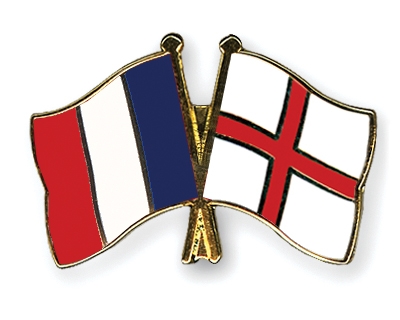
If you and France both stay out of English channel, there’s a small chance that you might be able to form an alliance with France. If you open to English channel, most French players will react by building fleets and doing what they can to kick you out of the channel.
Some players (not Your Bored Brother) are reluctant to commit to war against France in 1901, perhaps due to general preference for noncommittal opening, or due to a (misguided) belief that England should seek alliance with France.
“Should I move my army to Edinburgh or Yorkshire?”
Moving the army to Edinburgh is the better move so long as France doesn’t move into English Channel. So I would say that moving to Edinburgh is a risky move with a reasonable payoff.
The advantage of being in Edinburgh—which is nothing to sniff at—is that the army can be convoyed by either of your fleets. This is a big deal, because it means you have options in Autumn 1901. You could:
- Convoy the army into Norway with Norwegian Sea to get your build, and do something else with North Sea (like moving to Belgium to bounce France and/or Germany, or supporting the player into Belgium who you want to ally).
- Convoy the army into Norway with North Sea to get your build, and move Norwegian Sea to Barents sea for a powerful follow-up attack on Russia in 1902 (this can be strong if neither France nor Germany seem threatening).
- Take Norway with Norwegian Sea and convoy the army into Belgium with North Sea (this move is probably only worth doing if France and Germany bounced each other out of Burgundy and thus neither player can stop you from convoying into Belgium. Do not attempt this if you can be bounced in Belgium; getting your army onto the continent where you can actually use it is too important).
Remember, the other players do not know which follow up moves you are going to make, and many options are reasonable here. That ambiguity is powerful, because all your neighbors have to consider defending themselves, and they all have to consider whether or not you will ally them, and may attempt to curry your favor if they have been attacked in 1901 by players other than you.
Moving the army to Yorkshire is weaker if France doesn’t attack, but affords you some protection if France does attack.
- Your follow-up options are reduced by about half, because your army must be convoyed by North Sea. The ability to convoy with Norwegian Sea would free up North Sea to interfere with Belgium.
- However, if France opens to English channel and Picardy (a rarely-seen all-out attack on England) while you opened to Edinburgh, France will be positioned to make powerful follow-up moves—including a devastating convoy into Wales from Picardy that you cannot possibly stop.
I recommend against the Yorkshire variation of the Northern Opening. Most French players do not open to English Channel, and even if they do, they use this to attack Belgium or London to get a build. French players are almost never able to convoy into Wales in 1901; I can’t recall ever seeing a player try it in Gunboat. From a cost-benefit perspective, the ability to convoy with either of your fleets offers is worth the risk.
“So what is England’s best opening?”
Hands down: I open to English Channel as England. I recommend that you do this as well.
As you play your matches, you may find that many English players do not open as I recommend. If my own Gunboat experiences are representative, I think my opinion is in the minority. (Although maybe that is no longer the case, as my blog might be altering the Gunboat metagame.)
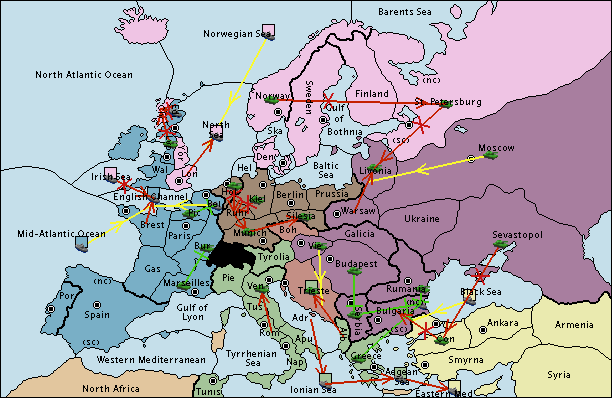
It astounds me that so many Gunboat players think opening North and going for Scandinavia is the best way to play England. I’ve played in way, way too many games which begin with England throwing everything North/East, mangling Russia and Germany only to lose all the English home centers to France. (For a clear example of this in a high-level Gunboat match, read through this After Action Report.)
This foolish English plan often sets up a French solo win because the tactical situation in the Northeast makes it impossible to assemble a stalemate line around Scandinavia (e.g. there are two English units at Norway and St. Petersburg, and this is all that remains of England).
I can hear the voice of nay-sayers in my head: “England has no choice but to attack all-out to the Northeast and hope to make many builds quick enough to contain France. That’s the only way!” To that I say: I always open to English Channel—and I do very well as England in Gunboat.
I think players who favor the Northern opening are making the following errors of judgment:
Error 1: They are Influenced by Press Diplomacy
In Press Diplomacy, the Northern opening is much stronger than it is in Gunboat Diplomacy. In Press Diplomacy, an England-France alliance is more realistic, and Russia is a more serious threat to England. But in Gunboat, France is England’s born enemy and Russia is almost a joke. In Gunboat, attacking Russia is not a priority for any power, let alone England. To learn more about this, read the recent guest post:
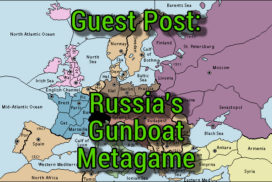
Error 2: They Overvalue Scandinavia/St. Petersburg

The supply centers at Scandinavia and St. Petersburg are relatively easy for England to capture (and thus they are tempting). But strategically, those supply centers are of marginal value for the same reason. Scandinavia and St. Petersburg can be rolled up by a strong England at any point in the match; they are almost impossible for England’s rivals to put behind a stalemate line.
By contrast, Portugal, Spain, and Marseilles are challenging—or even impossible—to capture during endgame. This is because a coalition of anti-English defenders can stalemate those centers from the South with relative ease. During endgame, would you rather be trying to capture St. Petersburg (which you are virtually guaranteed to capture if you are a large England) or Portugal (the single-most-difficult to capture center on the entire map)?
As I wrote in Solo Win Tip #1: Forget the Numbers Game, all supply centers are not created equal. The difficult-to-capture Portugal is probably worth more to England than all three of those other centers combined.
Error 3: They Learned a Wrong Lesson about Germany
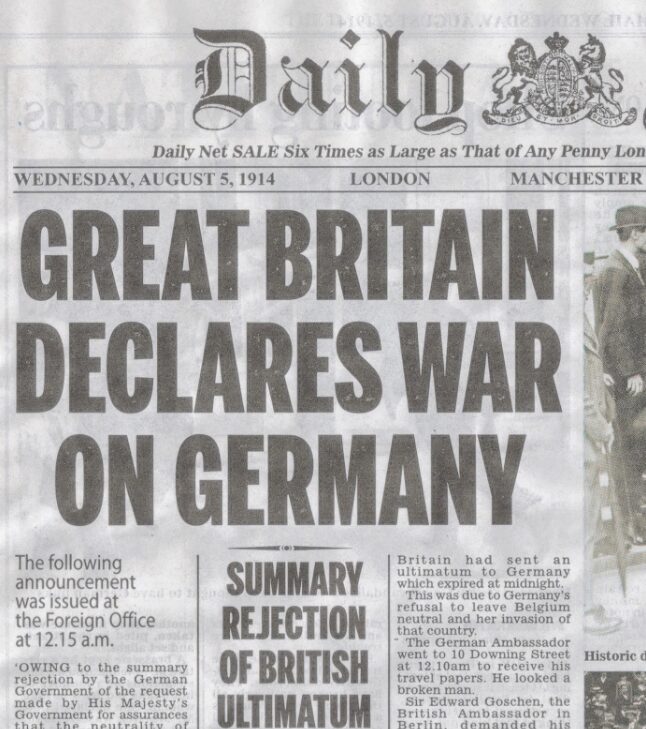
Last time I played Gunboat as England, I attacked France…and yet got totally clobbered by Germany! This time, I’m going to attack Germany first.
Your Typical Gunboater
Look, that happens. Yes, sometimes Germany invades England. But France is not somehow less of a threat because you have lost to Germany before.
Conclusion
And there you have it: I unequivocally recommend this Gunboat Diplomacy Opening for England: London to English Channel, Edinburgh to North Sea, Liverpool to Yorkshire.
Not convinced? Your mind blown? Write a comment below! I read all the comments on my blog.
If you liked this article, consider popping over to Patreon and becoming one of my Patrons. I’ve recently seen a spike in fan support, and this has motivated me to work harder on my blog than ever. Every dollar counts; maybe yours will give me the extra oomph to write 6 more articles like this one!
Footnotes
| ↑1 | Referring to the situation where a unit is dislodged and has no retreat option, so it must disband. |
|---|---|
| ↑2 | Typically Germany reaches 5 by capturing Denmark and Holland, and France by capturing Spain and Portugal. |
| ↑3 | Even if Russia does open to Moscow, it does not help Russia much to bounce England out of Norway in Autumn 1901. A bounce at Norway doesn’t result in a capture for Russia, and prevents Russia from building an additional unit at St. Petersburg. So Russia will, as often as not, follow up in Autumn 1901 by moving the army at St. Petersburg to Finland and building another unit in St. Petersburg. Therefore, as England, you can be fairly confident that you will be able to capture Norway in 1901. |

Is there a metagame shift that would change your opinion of which opening was best? Or would any metagame still suggest to you a cautious opening as England and then modify the followup?
My ideas about Gunboat Diplomacy have evolved over time, so I won’t say “there’s nothing that would change my mind.” But right now I can’t call to mind a metagame in which I would prefer a different opening.
Another reason for the English Channel opening, in my opinion, is that a Russian army in Norway can actually be very good for the English position long-term. Should Russia decide to open into StP, having two units on Norway encourages Russia to move StP-Fin and build a fleet on the North Coast of StP, ending in an annoying war with Russia that takes more units than it is worth. But if Russia decides to park an army in Norway, they will likely not build a fleet on the North Coast, and so you will likely not have to worry about your Eastern flank, and Russia can potentially distract Germany later on with their new units. That said, I do not have enough gunboat experience to form a clear opinion of my own yet. https://brotherbored.com/guest-post-how-to-fix-russias-gunboat-metagame/
Great post. My views closely track yours.
Something else I’ll point out is that England often needs German help to secure Scandinavia, and Germany often is reluctant to provide that help if England doesn’t do something upfront to help Germany.
Many novice German players will seal their fate by bouncing Russia out of Sweden before England commits itself against France. The bounce essentially ends Russia’s northern game before it begins, which eliminates Russia as a counterweight to England in Scandinavia. Germany soon sinks as an Anglo-French alliance rolls up the western half of the board with one outmatched German as the lone opposition.
Savvier German players almost never bounce Sweden if England opens north for this reason. And once Russian players are allowed to take Sweden, they very commonly build a second northern unit. That threat requires England to commit all its forces east to win the fight for Scandinavia… which is EXACTLY the opening France needs.
Ironically, opening south can often make you STRONGER in Scandinavia, because Germany’s help is worth so much more than the extra fleet.
I wondered if you could comment on what to do when Germany can’t take a hint. More specifically, I took a lot of your advice in my latest gunboat campaign as England and things have worked out well within the first year regarding France. I also tried to ensure that Germany had a great first year and I thought they would be grateful but the opposite seems have happened as they are working with Russia against me. Now, I have a powerful Germany working with a powerful Russia against me in the North as I’m trying to weaken and gain ground against France..
Any tips or suggestions or insight as to what I could/should have done differently is appreciated.
Game: https://www.vdiplomacy.com/board.php?gameID=47792#gamePanel
Thanks for your comment James! In general, I hesitate to give advice for an ongoing match, as public discussions of ongoing matches (and sometimes, getting help from another player without permission) can be against the site policies. I am confident I can answer your questions or give you some advice, but I’d probably have to break down the particular match move-by-move with you. Platitudes probably won’t help you, if you see what I mean. You might try reaching out to me on Discord when your match is over. If you’re up to it, I’d even take this as a Diplomacy Dojo topic.
“So Russia will, as often as not, follow up in Autumn 1901 by moving the army at St. Petersburg to Finland and building another unit in St. Petersburg. Therefore, as England, you can be fairly confident that you will be able to capture Norway in 1901.” BUT IF NOT = DOOM